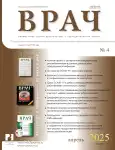The influence of ABCB1 gene polymorphisms on the development of threatened preterm labor in pregnant women of the Russian population
- Authors: Akopov K.O.1, Chilova R.A.2, Sokova E.A.2, Kazakov R.E.3, Zhukova E.V.2, Poznyak M.V.2, Zholobova M.N.2, Sevastyanov G.E.2
-
Affiliations:
- Yudin City Clinical Hospital of the Moscow Department of Health
- Sechenov First Moscow State Medical University
- Scientific Centre for Expert Evaluation of Medicinal Products
- Issue: Vol 36, No 4 (2025)
- Pages: 67-70
- Section: From Practice
- URL: https://medbiosci.ru/0236-3054/article/view/290944
- DOI: https://doi.org/10.29296/25877305-2025-04-14
- ID: 290944
Cite item
Abstract
Objective. To study the associations of alleles and genotypes of polymorphic markers of the ABCB1 gene with predisposition to the threatened preterm labor.
Material and methods. The study included 96 pregnant women with an established diagnosis of threatened premature birth (main group) and 87 practically healthy pregnant women with timely spontaneous labor (control group) in accordance with the inclusion/exclusion criteria. Genotyping to identify polymorphisms rs1045642 (3435C > T), rs2032582 (2677G > T), rs1128503 (1236C > T) of the ABCB1 gene was carried out by real-time PCR.
Results. The distribution of genotypes by the studied polymorphisms corresponded to the Hardy-Weinberg distribution in the control and main groups. No significant differences were found in the frequencies of alleles and genotypes of ABCB1 gene polymorphisms in the studied groups of pregnant women.
Conclusion. The studied ABCB1 gene polymorphisms are not associated with threatened preterm labor in Russian pregnant women. The allele and genotype frequencies of the rs11285503, rs2032582, and rs1045642 ABCB1 gene polymorphisms correspond to the literature data on their occurrence in the Caucasian population.
Full Text
##article.viewOnOriginalSite##About the authors
K. O. Akopov
Yudin City Clinical Hospital of the Moscow Department of Health
Email: rchilova@gmail.com
ORCID iD: 0000-0002-3268-481X
Russian Federation, Moscow
R. A. Chilova
Sechenov First Moscow State Medical University
Author for correspondence.
Email: rchilova@gmail.com
ORCID iD: 0000-0001-6331-3109
SPIN-code: 4137-4848
MD, Professor
Russian Federation, MoscowE. A. Sokova
Sechenov First Moscow State Medical University
Email: rchilova@gmail.com
ORCID iD: 0000-0002-6389-2099
SPIN-code: 5550-4650
Candidate of Medical Sciences, Associate Professor
Russian Federation, MoscowR. E. Kazakov
Scientific Centre for Expert Evaluation of Medicinal Products
Email: rchilova@gmail.com
ORCID iD: 0000-0003-0802-4229
SPIN-code: 8751-5090
Candidate of Biological Sciences
Russian Federation, MoscowE. V. Zhukova
Sechenov First Moscow State Medical University
Email: rchilova@gmail.com
ORCID iD: 0000-0003-3949-7109
SPIN-code: 4300-8885
Candidate of Medical Sciences
Russian Federation, MoscowM. V. Poznyak
Sechenov First Moscow State Medical University
Email: rchilova@gmail.com
ORCID iD: 0009-0006-8217-0784
Russian Federation, Moscow
M. N. Zholobova
Sechenov First Moscow State Medical University
Email: rchilova@gmail.com
ORCID iD: 0000-0003-2842-2910
Candidate of Medical Sciences
Russian Federation, MoscowG. E. Sevastyanov
Sechenov First Moscow State Medical University
Email: rchilova@gmail.com
ORCID iD: 0009-0000-4823-9510
Russian Federation, Moscow
References
- Talati A.N., Hackney D.N., Mesiano S. Pathophysiology of preterm labor with intact membranes. Semin Perinatol. 2017; 41 (7): 420–6. doi: 10.1053/j.semperi.2017.07.013
- Coler B.S., Shynlova O., Boros-Rausch A. et al. Landscape of Preterm Birth Therapeutics and a Path Forward. J Clin Med. 2021; 10: 2912. doi: 10.3390/jcm10132912
- Gondane P., Kumbhakarn S., Maity P. et al. Recent Advances and Challenges in the Early Diagnosis and Treatment of Preterm Labor. Bioengineering. 2024; 11 (2): 161. doi: 10.3390/bioengineering11020161
- Plunkett J., Borecki I., Morgan T. et al. Populationbased estimate of sibling risk for preterm birth, preterm premature rupture of membranes, placental abruption and pre-eclampsia. BMC Genet. 2008; 9: 44. doi: 10.1186/1471-2156-9-44
- Казаков Р.Е., Чилова Р.А., Акопов К.О. и др. Полиморфизм гена ADRB2 и состояние угрозы преждевременных родов. Фармакогенетика и фармакогеномика. 2021; 1: 9–17 [Kazakov R., Chilova R., Akopov K. et al. ADRB2 gene polymorphism and preterm labor. Pharmacogenetics and pharmacogenomics. 2021; 1: 9–17 (in Russ.)]. doi: 10.37489/2588-0527-2021-1-9-17
- Bloise E., Ortiga-Carvalho T.M., Reis F.M. et al. ATP-binding cassette transporters in reproduction: a new frontier. Hum Reprod Update. 2016; 22: 164–81. doi: 10.1093/humupd/dmv049
- Kozlosky D., Barrett E., Aleksunes L.M. Regulation of Placental Efflux Transporters during Pregnancy Complications. Drug Metab Dispos. 2022; 50: 1364–75. doi: 10.1124/dmd.121.000449
- Michael A.E. Potential significance of physiological and pharmacological glucocorticoids in early pregnancy. Hum Reprod Update. 2008; 14 (5): 497–517. doi: 10.1093/humupd/dmn021
- Ieiri I. Functional significance of genetic polymorphisms in P-glycoprotein (MDR1, ABCB1) and Breast cancer resistamce protein (BCRP, ABCG2). Drug Metab Pharmacokinet. 2012; 27 (1): 85–105. doi: 10.2133/dmpk.dmpk-11-rv-098
- Manuck TA. Pharmacogenomics of preterm birth prevention and treatment. BJOG. 2016; 123 (3): 368–75. doi: 10.1111/1471-0528.13744
- WHO recommendation on tocolytic therapy for improving preterm birth outcomes. Geneva: World Health Organization, 2022.
- Клинические рекомендации «Преждевременные роды» (утв. Минздравом России) [Clinical guidelines «Preterm birth» (approved by the Ministry of Health of Russia) (in Russ.)]. URL: http://cr.rosminzdrav.ru/
- WHO, Preterm birth, 10.05.2023. URL: https://www.who.int/news-room/fact-sheets/detail/preterm-birth
- Cascorbi I. P-glycoprotein: tissue distribution, substrates, and functional consequences of genetic variations. Handb Exp Pharmacol. 2011; 201: 261–83. doi: 10.1007/978-3-642-14541-4_6
- Сычев Д.А., Леванов А.Н., Шелехова Т.В. и др. Влияние полиморфизма генов ABCB1 и CES1 на уровни равновесных концентраций дабигатрана у пациентов после эндопротезирования коленного сустава. Атеротромбоз. 2018; 1: 122–30 [Sychev D., Levanov А., Shelekhova T. et al. Impact of ABCB1 and CES1 genetic polymorphisms on trough steady-state dabigatran concentrations in patients after endoprosthesis of knife join. Atherothrombosis. 2018; 1: 122–30 (in Russ.)]. doi: 10.21518/2307-1109-2018-1-122-130
Supplementary files








